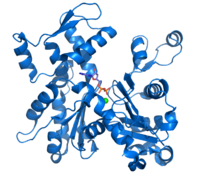
Photo from wikipedia
Following T‐cell antigen receptor (TCR) engagement, rearrangement of the actin cytoskeleton supports intracellular signal transduction and T‐cell activation. The non‐catalytic region of the tyrosine kinase (Nck) molecule is an adapter… Click to show full abstract
Following T‐cell antigen receptor (TCR) engagement, rearrangement of the actin cytoskeleton supports intracellular signal transduction and T‐cell activation. The non‐catalytic region of the tyrosine kinase (Nck) molecule is an adapter protein implicated in TCR‐induced actin polymerization. Further, Nck is recruited to the CD3ε subunit of the TCR upon TCR triggering. Here we examine the role of actin polymerization in the recruitment of Nck to the TCR. To this end, Nck binding to CD3ε was quantified in Jurkat cells using the proximity ligation assay. We show that inhibition of actin polymerization using cytochalasin D delayed the recruitment of Nck1 to the TCR upon TCR triggering. Interestingly, CD3ε phosphorylation was also delayed. These findings suggest that actin polymerization promotes the recruitment of Nck to the TCR, enhancing downstream signaling, such as phosphorylation of CD3ε.
Journal Title: Immunology
Year Published: 2019
Link to full text (if available)
Share on Social Media: Sign Up to like & get
recommendations!